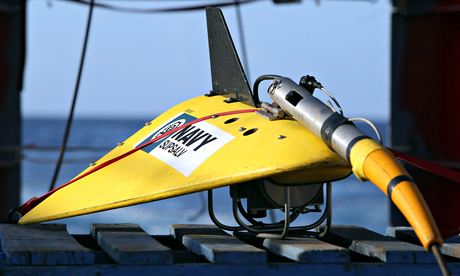MH370: Chinese patrol ship detects pulse signal

A pinger locator sits on an Australian ship in the southern Indian Ocean during the search for the black box of the missing Malaysian Airlines flight MH370. Photograph: Reuters
A Chinese search ship has detected an electronic pulse in an area of the southern Indian Ocean where it is believed the missing Malaysian Airlines plane crashed, state media has announced.
"Chinese patrol ship Haixun 01 searching for flight MH370 discovered a pulse signal with a frequency of 37.5kHz per second in south Indian Ocean waters Saturday," the official news agency, Xinhua, said. It also reported that a Chinese air force plane spotted a number of white floating objects in the search area.
Anish Patel, president of Dukane Seacom – which has said it made the beacons for the flight data and cockpit voice recorders on board MH370 – told CNN the pulse was identical to the standard beacon frequency.
The Haixun 01, one of two Chinese ships in the area, picked up the signal at about 25 degrees south latitude and 101 degrees east longitude, Xinhua reported.
"It is yet to be established whether it is related to the missing jet," it said.
China's Liberation Daily reported that three people on board the ship had heard the signals, which had not been recorded because they came suddenly.
The Australian defence minister, David Johnston, said he had not received a report on the signal and warned that it may not be from the plane.
"This is not the first time we have had something that has turned out to be very disappointing," he told ABC television.
The report is the first potentially positive sign in the race against time to find the Malaysian aircraft's black box. But there is as yet no indication of whether the pulse is in fact connected to the plane, and no wreckage has been found in the area despite a massive international hunt.
Experts have warned that the electronic beacons designed to guide searchers to the flight data and cockpit voice recorders will stop emitting signals within the next two weeks, and perhaps even within the next few days, as they run out of power.
The Beijing-bound Boeing 777 disappeared in the early hours of 8 March, shortly after taking off from Kuala Lumpur with 239 people on board. Investigators believe it was deliberately diverted from its course, but experts say that without the flight data and cockpit voice recorders there is little hope of finding out who was responsible and why. Even then, they caution that the information may not shed much light on the mystery.
Multiple countries are involved in the search, with 13 aircraft and at least 11 vessels scouring an area some 1,700 kilometres north-west of Perth on Saturday.
Australia is leading the hunt for the plane. Authorities there have yet to comment on the Xinhua report.
More than 150 of those on board the flight were Chinese nationals and China has contributed several ships and vessels to the search.
Malaysia said on Saturday it had launched an investigation into the disappearance of MH370 that would bring together international aviation experts.
The defence and acting transport minister, Hishammuddin Hussein, told a news conference that Australia, China, the US, the UK and France had agreed to take part in the investigation. The team would examine maintenance records, flight recorders, meteorology and "medical and human factors", including psychology.

No comments:
Post a Comment